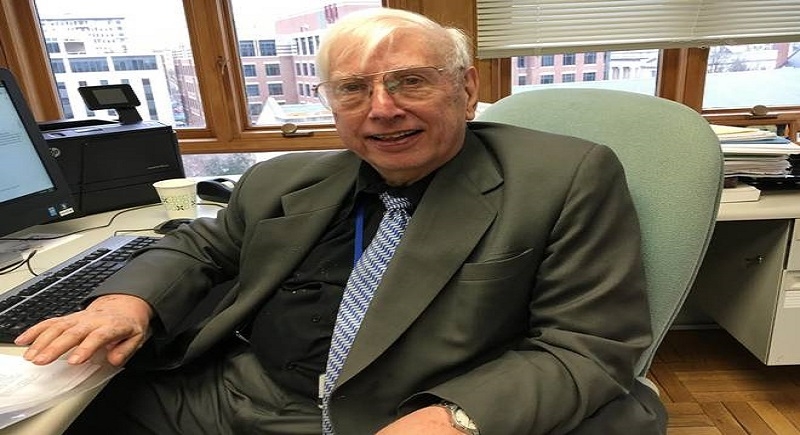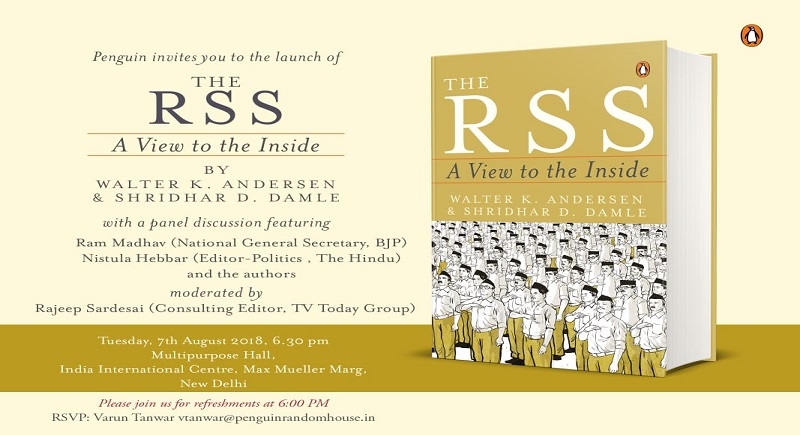Anderson falters on his views about RSS

On 11 August 2018, Indian Express carried an interview of Walter Anderson, co-author of “RSS A View To The Inside”. (https://indianexpress.com/article/lifestyle/books/a-battle-between-hindutva-and-hinduism-is-coming-walter-andersen-rss-5301109/ ). While I have not yet read the book, but I could get a sense of it since it is a rather long interview. I am not sure how many communists; liberals would have felt insulted by the first line of interview, which says “Walter Andersen is perhaps the only scholar to have observed the Rashtriya Swayamsevak Sangh for nearly five decades.”
Anyway let’s move to the interview. Anderson’s introduction to RSS via ABVP is interesting. But, claim of being insider seems flawed with many misleading and misunderstanding statements in the interview. He says in the interview that first affiliate organisation of RSS is Jan Sangh, post ban which is wrong. It was ABVP which came up during first RSS ban itself in 1949 while Bharatiya Mazdoor Sangh was born in 1955, not along with ABVP. Such a blunder from a person claiming to be researching RSS for five decades is shocking. There are lot more shocks in the interview.
From what I understand from his conversation, he met Shri Eknath Ranade, one of the senior prachaaraks of RSS, no doubt. But, he was not a senior prachaarak in Delhi. At that time he hints at, Ranade was Sarkaryavaah, the highest elected and executive post in RSS. He was relieved of this post in 1962-63 to put his entire energy into Vivekanand Rock Memorial.
I do not agree that RSS people don’t know that ‘We or Our Nationhood Defined’ book was not his. The original book was by Babarao Savarkar, brother of Veer Savarkar who had written the book in Marathi. Guruji translated it, but then translation was lost in some accident. So, he rewrote it, and that is the book people saw in English. This was before he became RSS Chief. Many people don’t know that Guruji came to RSS at quite a senior age and was not young inductee like Balasaheb Deoras etc. In latest biography of Guruji’s written by senior RSS prachaarak Shri Ranga Hari, Guruji is quoted as saying that ‘We’ is no more relevant. It was never republished nor accepted as RSS views on nationhood.
He claims that “Golwalkar was spiritual, not religious. He did not follow religious rituals.” Again he slips up. Guruji was an ordained Sanyasi of Ram Krishna Mission order, initiated by Swami Akhandananda, Gurubhai of Swami Vivekananda. He always carried ‘kamandalu’ he received from his Guru and did regular ‘sandhya’ as expected of a sadhu. Yes, he never imposed rituals on anybody. In fact, he criticised people only doing rituals and said that putting tilak on forehead is not being Hindu. One needs to be dedicated to the society and nation.
On Muslim question, Balasaheb Deoras only carried forward what Guruji had said in later years, he didn’t took a different line. Guruji’s interview with a senior writer Jeelani spelt out his views on Muslims being from same Hindu stock who would stay on in India without any fear or favour. We need to remember that the first generation of RSS, led by Guruji was involved in saving and rehabilitating displaced Hindus and Sikhs during partition. The feeling of Hindu society at that time was naturally negative about Muslims and Pakistan. It had a historical context. For Guruji and right up to Mohan Bhagwat, Muslims are always seen as from same genes as Hindus. It is the Islamist mind set (as it is called now) that RSS always criticised. Its view has been that Muslims shouldn’t identify themselves with violent invaders as they too suffered from their atrocities.
On caste system, Anderson seems to suggest that Deoras took a different line. But, that’s misleading. Guruji had clearly said that varna system at one time was a good division of labour but it had deteriorated and no more valid, ‘kaal baahya’ – out of tune of times and invalid. In fact, in his biography, Hari ji quotes an incident where Karpatri ji maharaj was very upset with Guruji as he refused to use RSS cadre to further the cause of caste system. Not only this, he persuaded all the Shankaracharyas and Dharma Gurus in first VHP conference that No Hindu can be ‘patit’ or sinful or fallen and that all Hindus were from same mother’s womb (sahodar) hence brothers. There couldn’t be a clearer statement than this from Hindus ever. Balasaheb Deoras only carried it forward. Thus, this urge of viewers of RSS to show Guruji as orthodox vis a vis more progressive Deoras is a misleading construct. RSS never discriminated on caste. Anderson’s claim that Deoras proposed non-Brahmins as prachaaraks is mischievous not just misleading. In RSS everybody rises as per his skills and devotion not because of caste. Anderson says RSS Pracharaks give up connections to the family. No sir, you will see all prachaaraks be in touch with family. They don’t participate in family affairs but do meet family and present in the family ceremonies, right from Guruji’s time till today.
Just as in his chronology of earlier organizations, Anderson again makes a bloomer. Stree Shakti is not the latest. It is decades old organization. Latest is ‘Saksham’ the organisation for differently abled people.
There are some incomplete statements. RSS Sarsanghchaalak does nominate his successor. But, it is not purely his decision. He interacts and discusses it with senior workers, prachaaraks of RSS and takes a decision based on their inputs and consensus. No RSS office bearer works independently in vacuum. All their decisions are team decisions.

On choice of Sanskrit, Guruji was not ‘Brahminical’ nor was Sanskrit taken as Brahminical imposition. Initial RSS prayers and orders were in Marathi and Hindi. As it spread, it needed a common linguist base that connected every corner of India. They found Sanskrit as the root or mother language of nearly all Indian languages. Thus, it was chosen as the language of RSS for prayer and orders etc. From beginning, RSS schools teach in mother tongue and Hindi is taken as the main language as largest numbers of people speak in Hindi. But, locally, local language is always preferred.
To say that Dr Mohan Bhagwat did not backtrack is again misleading or pop journalism. His statement was very clear that we “need to review whether reservations have reached the deserving or the well to do are using it, and why it has not reached the most deserving and deprived”. It was misrepresented by the opposition so clarification was issued. RSS has always supported reservations even through its resolutions.
Anderson is evasive about Ambedkar and RSS. RSS has always respected B R Ambedkar. He is part of morning shlokas since beginning. Many still cannot believe that senior most prachaarak Dattopant Thengdi was his election agent when he fought from Bhandara. B R Ambedkar was against caste system and mistreatment of Scheduled Castes and tribes but he was not enemy of Hindus and that is what RSS believes. He firmly refused to convert to Christianity or Islam as he believed that his followers would be ideally be rooted in Indic culture, so he chose Buddha dharma. His views on Islam are well known.
RSS views on women are well known. Its founder supported setting up of Rashtra Sevika Samiti. Till today RSS helps it as and when it is required. Except Shakha women play a very important role in other organisations of RSS.
Ashutosh Varshney, for obvious reasons tries to imply that there is confusion in RSS about Bharat suffering 1000-1200 years of slavery. Anderson seems to agree with it partially if not fully. There has never been any confusion. British brought Colonisation. Mixing it up with slavery is a later construct brought in by Left and West. From Guruji to Mohan ji Bhagwat this is the stand.
I have serious reservations about his view on all his three risks Anderson talks about. Battle between Hindutva and Hinduism. This is a leftist paradigm. RSS has very carefully, bringing Hindu society to a thinking about need to preserve essence of Hinduness where there is huge scope for diversity of way to worship and social customs and still reform it. On vigilantism, RSS or its affiliates have never been a part of vigilantism and RSS chief has been unambiguously critical about it. Third point about Urban rural split is an issue of economic development. If development is equitable then there is no clash, and this is what RSS has been impressing upon governments – whichever be the party. Integral Humanism as a philosophy is its guiding idea and so is that of BJP.
I can go on for few hundred words but rather than that I will suggest reader to go through Ratan Sharda’s book “RSS 360 °: Demystifying Rashtriya Swayamsevak Sangh “. I have no hesitation in saying that the book written by an insider is much better than the one written by an outsider claiming to be an insider.
